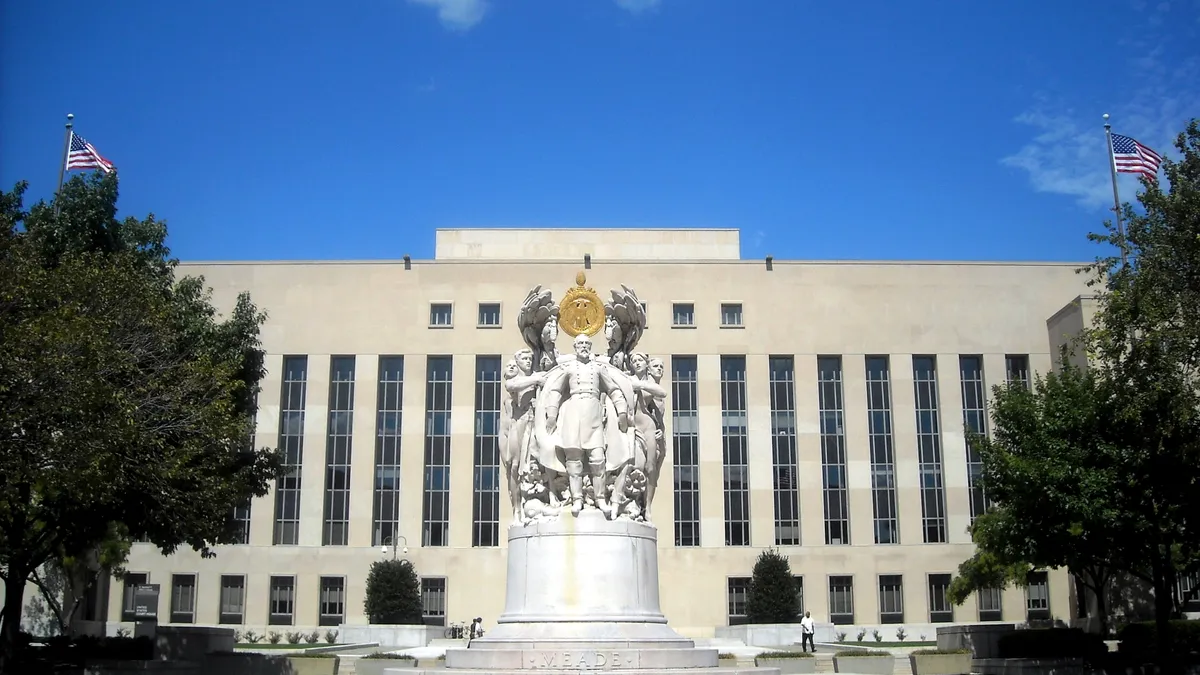Dive Brief:
-
A three judge panel on the U.S. Court of Appeals for the D.C. Circuit pressed counsel on Tuesday on whether or not a landmark federal storage order was encroaching on state authority over the distribution system.
-
Order 841, issued by the Federal Energy Regulatory Commission in 2018, was intended to expand the ability of storage to participate in wholesale power markets. But critics of the order are stuck on "one small and unnecessary aspect of the rule" which attempts to "curtail state authority" over the distribution system, Jennifer Murphy, director of energy policy and senior counsel for the plaintiff, the National Association of Regulatory Utility Commissioners, told judges during virtual oral arguments.
-
The language in question says that states may not "broadly prohibit" resources from participating in federally regulated wholesale markets. FERC and clean energy groups argue the rule does not inhibit states' ability to regulate their distribution systems, but rather ensures energy storage resources aren't prevented from participating in the market.
Dive Insight:
Storage advocates see Order 841 as a crucial tool to help accelerate energy storage deployment across regulated wholesale markets. But utilities and states in their petition to the court argued FERC overstepped its authority in issuing this rule by potentially hindering state regulatory authority.
The fundamental question for the judges is whether the order's instructions to regional transmission organizations (RTOs) and independent system operators (ISOs), which will govern the way storage systems are able to participate in the wholesale market, messes with a state's ability to safely govern the reliability of its distribution system.
"This case isn't about the validity of the majority of the storage rule, it's about the validity of a discrete portion of the rule in which FERC asserts that states may not 'broadly prohibit' local, state regulated storage resources on the distribution system from participating in federally regulated wholesale markets," Murphy told the judges Tuesday. That language in 841 "disregards" state authority over the distribution system, rendering it "unlawfully written."
Judges pressed Murphy on whether the order would fundamentally harm states, and whether there were specific states vying for the ability to ban energy storage systems from connecting to the wholesale market.
NARUC members don't necessarily want to use an "opt-out" option, but they want "to preserve the ability" to do so, said Murphy. "This [order] takes away one of the tools in their toolbox." Utility groups did not respond to request for comment by publication time.
But FERC counsel Anand Viswanathan argued "the rule itself does not impose any obligations whatsoever on any facility local distribution or otherwise … to the extent that there is some effect at the distribution level, that ship has sailed long before this rule."
The distribution system itself might be impacted by this order, he said, as it will likely lead to heightened deployment of energy storage facilities onto the power grid. But FERC is not imposing obligations on states to change the way they regulate those systems, he argued.
"The fact that there might be effects on the distribution system as a result of this rule is not the same thing as the commission imposing obligations on states or on distribution owning utilities," he said. "A homeowner still has to go through the rules that exist in her state to connect to the grid ... the broad language means that a state cannot take away the choice of a resource to voluntarily participate" in the wholesale power market.
There is some risk to states hindering the ability of storage to participate in wholesale markets without that language, Jeff Dennis, managing director and general counsel at Advanced Energy Economy told Utility Dive.
"The concern that we've always had as an industry is that states would enact very broad bans on wholesale market participation by these resources that would potentially limit business models or limit the ability of customers to" provide wholesale services and access revenue streams from those services, he said.
RTOs and ISOs have been issuing compliance filings for the past two years as part of obligations under the federal order to issue tariffs that will help bring energy storage onto the market. If the court chooses to reverse part of the order, it would raise new questions about how those entities would handle compliance, said Dennis.
He felt the court was leaning against vacating 841, based on judge's comments and lines of questioning, but said the court may leave the question of how FERC's authority could inhibit states' ability to regulate the reliability and safety of distribution systems up to a future case.
"Will there become conflicts where a state does something that it argues is in the name of safety and reliability, and a storage developer, or a customer ... says, 'I think what you're actually doing is blocking my access to the wholesale market?' You can see that dispute in the future," he said.
The U.S. Energy Storage Association (ESA) also predicts the judges will rule to uphold the order.
"FERC’s counsel did an admirable job of laying out the importance of distributed energy storage access to wholesale markets, in line with FERC’s responsibility to ensure just and reasonable rates," Jason Burwen, vice president of policy for ESA told Utility Dive in an email. "We are cautiously optimistic that the questions focused by the D.C. Circuit on whether states could prove harm may be a signal that the Court is not inclined to vacate the Order ... a reversal by the Court would cause significant disruption to electric system innovation and resilience provided by distributed storage."















